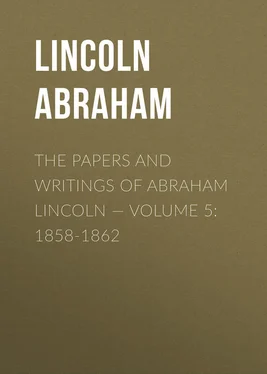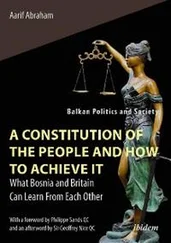Abraham Lincoln - The Papers And Writings Of Abraham Lincoln — Volume 5 - 1858-1862
Здесь есть возможность читать онлайн «Abraham Lincoln - The Papers And Writings Of Abraham Lincoln — Volume 5 - 1858-1862» — ознакомительный отрывок электронной книги совершенно бесплатно, а после прочтения отрывка купить полную версию. В некоторых случаях можно слушать аудио, скачать через торрент в формате fb2 и присутствует краткое содержание. Жанр: foreign_antique, foreign_prose, на английском языке. Описание произведения, (предисловие) а так же отзывы посетителей доступны на портале библиотеки ЛибКат.
- Название:The Papers And Writings Of Abraham Lincoln — Volume 5: 1858-1862
- Автор:
- Жанр:
- Год:неизвестен
- ISBN:нет данных
- Рейтинг книги:4 / 5. Голосов: 1
-
Избранное:Добавить в избранное
- Отзывы:
-
Ваша оценка:
- 80
- 1
- 2
- 3
- 4
- 5
The Papers And Writings Of Abraham Lincoln — Volume 5: 1858-1862: краткое содержание, описание и аннотация
Предлагаем к чтению аннотацию, описание, краткое содержание или предисловие (зависит от того, что написал сам автор книги «The Papers And Writings Of Abraham Lincoln — Volume 5: 1858-1862»). Если вы не нашли необходимую информацию о книге — напишите в комментариях, мы постараемся отыскать её.
The Papers And Writings Of Abraham Lincoln — Volume 5: 1858-1862 — читать онлайн ознакомительный отрывок
Ниже представлен текст книги, разбитый по страницам. Система сохранения места последней прочитанной страницы, позволяет с удобством читать онлайн бесплатно книгу «The Papers And Writings Of Abraham Lincoln — Volume 5: 1858-1862», без необходимости каждый раз заново искать на чём Вы остановились. Поставьте закладку, и сможете в любой момент перейти на страницу, на которой закончили чтение.
Интервал:
Закладка:
But the mere leaving out is not the most remarkable feature of this most remarkable essay. His proposition is to establish that the leading men of the Revolution were for his great principle of nonintervention by the government in the question of slavery in the Territories, while history shows that they decided, in the cases actually brought before them, in exactly the contrary way, and he knows it. Not only did they so decide at that time, but they stuck to it during sixty years, through thick and thin, as long as there was one of the Revolutionary heroes upon the stage of political action. Through their whole course, from first to last, they clung to freedom. And now he asks the community to believe that the men of the Revolution were in favor of his great principle, when we have the naked history that they themselves dealt with this very subject matter of his principle, and utterly repudiated his principle, acting upon a precisely contrary ground. It is as impudent and absurd as if a prosecuting attorney should stand up before a jury and ask them to convict A as the murderer of B, while B was walking alive before them.
I say, again, if judge Douglas asserts that the men of the Revolution acted upon principles by which, to be consistent with themselves, they ought to have adopted his popular sovereignty, then, upon a consideration of his own argument, he had a right to make you believe that they understood the principles of government, but misapplied them, that he has arisen to enlighten the world as to the just application of this principle. He has a right to try to persuade you that he understands their principles better than they did, and, therefore, he will apply them now, not as they did, but as they ought to have done. He has a right to go before the community and try to convince them of this, but he has no right to attempt to impose upon any one the belief that these men themselves approved of his great principle. There are two ways of establishing a proposition. One is by trying to demonstrate it upon reason, and the other is, to show that great men in former times have thought so and so, and thus to pass it by the weight of pure authority. Now, if Judge Douglas will demonstrate somehow that this is popular sovereignty, — the right of one man to make a slave of another, without any right in that other or any one else to object, — demonstrate it as Euclid demonstrated propositions, — there is no objection. But when he comes forward, seeking to carry a principle by bringing to it the authority of men who themselves utterly repudiate that principle, I ask that he shall not be permitted to do it.
I see, in the judge's speech here, a short sentence in these words: "Our fathers, when they formed this government under which we live, understood this question just as well, and even better than, we do now." That is true; I stick to that. I will stand by Judge Douglas in that to the bitter end. And now, Judge Douglas, come and stand by me, and truthfully show how they acted, understanding it better than we do. All I ask of you, Judge Douglas, is to stick to the proposition that the men of the Revolution understood this subject better than we do now, and with that better understanding they acted better than you are trying to act now.
I wish to say something now in regard to the Dred Scott decision, as dealt with by Judge Douglas. In that "memorable debate" between Judge Douglas and myself, last year, the judge thought fit to commence a process of catechising me, and at Freeport I answered his questions, and propounded some to him. Among others propounded to him was one that I have here now. The substance, as I remember it, is, "Can the people of a United States Territory, under the Dred Scott decision, in any lawful way, against the wish of any citizen of the United States, exclude slavery from its limits, prior to the formation of a State constitution?" He answered that they could lawfully exclude slavery from the United States Territories, notwithstanding the Dred Scot decision. There was something about that answer that has probably been a trouble to the judge ever since.
The Dred Scott decision expressly gives every citizen of the United States a right to carry his slaves into the United States Territories. And now there was some inconsistency in saying that the decision was right, and saying, too, that the people of the Territory could lawfully drive slavery out again. When all the trash, the words, the collateral matter, was cleared away from it, all the chaff was fanned out of it, it was a bare absurdity, — no less than that a thing may be lawfully driven away from where it has a lawful right to be. Clear it of all the verbiage, and that is the naked truth of his proposition, — that a thing may be lawfully driven from the place where it has a lawful right to stay. Well, it was because the judge could n't help seeing this that he has had so much trouble with it; and what I want to ask your especial attention to, just now, is to remind you, if you have not noticed the fact, that the judge does not any longer say that the people can exclude slavery. He does not say so in the copyright essay; he did not say so in the speech that he made here; and, so far as I know, since his re-election to the Senate he has never said, as he did at Freeport, that the people of the Territories can exclude slavery. He desires that you, who wish the Territories to remain free, should believe that he stands by that position; but he does not say it himself. He escapes to some extent the absurd position I have stated, by changing his language entirely. What he says now is something different in language, and we will consider whether it is not different in sense too. It is now that the Dred Scott decision, or rather the Constitution under that decision, does not carry slavery into the Territories beyond the power of the people of the Territories to control it as other property. He does not say the people can drive it out, but they can control it as other property. The language is different; we should consider whether the sense is different. Driving a horse out of this lot is too plain a proposition to be mistaken about; it is putting him on the other side of the fence. Or it might be a sort of exclusion of him from the lot if you were to kill him and let the worms devour him; but neither of these things is the same as "controlling him as other property." That would be to feed him, to pamper him, to ride him, to use and abuse him, to make the most money out of him, "as other property"; but, please you, what do the men who are in favor of slavery want more than this? What do they really want, other than that slavery, being in the Territories, shall be controlled as other property? If they want anything else, I do not comprehend it. I ask your attention to this, first, for the purpose of pointing out the change of ground the judge has made; and, in the second place, the importance of the change, — that that change is not such as to give you gentlemen who want his popular sovereignty the power to exclude the institution or drive it out at all. I know the judge sometimes squints at the argument that in controlling it as other property by unfriendly legislation they may control it to death; as you might, in the case of a horse, perhaps, feed him so lightly and ride him so much that he would die. But when you come to legislative control, there is something more to be attended to. I have no doubt, myself, that if the Territories should undertake to control slave property as other property that is, control it in such a way that it would be the most valuable as property, and make it bear its just proportion in the way of burdens as property, really deal with it as property, — the Supreme Court of the United States will say, "God speed you, and amen." But I undertake to give the opinion, at least, that if the Territories attempt by any direct legislation to drive the man with his slave out of the Territory, or to decide that his slave is free because of his being taken in there, or to tax him to such an extent that he cannot keep him there, the Supreme Court will unhesitatingly decide all such legislation unconstitutional, as long as that Supreme Court is constructed as the Dred Scott Supreme Court is. The first two things they have already decided, except that there is a little quibble among lawyers between the words "dicta" and "decision." They have already decided a negro cannot be made free by Territorial legislation.
Читать дальшеИнтервал:
Закладка:
Похожие книги на «The Papers And Writings Of Abraham Lincoln — Volume 5: 1858-1862»
Представляем Вашему вниманию похожие книги на «The Papers And Writings Of Abraham Lincoln — Volume 5: 1858-1862» списком для выбора. Мы отобрали схожую по названию и смыслу литературу в надежде предоставить читателям больше вариантов отыскать новые, интересные, ещё непрочитанные произведения.
Обсуждение, отзывы о книге «The Papers And Writings Of Abraham Lincoln — Volume 5: 1858-1862» и просто собственные мнения читателей. Оставьте ваши комментарии, напишите, что Вы думаете о произведении, его смысле или главных героях. Укажите что конкретно понравилось, а что нет, и почему Вы так считаете.












